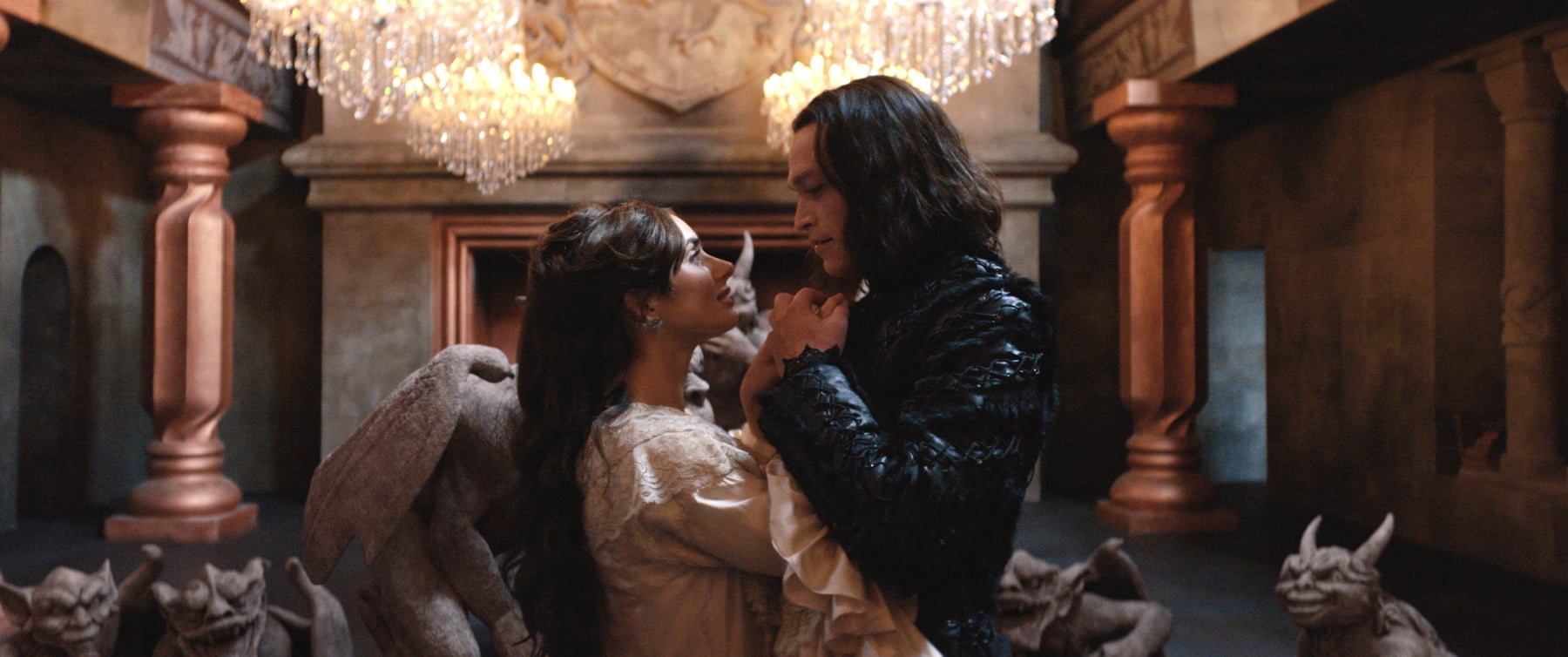




Dir/Wri: Luc Besson | Cast: Caleb Landry Jones, Christophe Waltz, Matilda De Angelis, Zoe Bleu, Ewens Abid, Haymon Maria Buttinger, Jassem Mougari | France, Horror | 2025. 129′
Hot on the heels of Robert Eggers’ Nosferatu, and with another ‘Dracula’ waiting in the wings from the Romanian director Radu Jude, this opulent, erotically charged French-themed foray, written and helmed by Luc Besson, translocates some of the action to Paris where the director sexes up Bram Stoker’s 1897 Gothic tale – but makes it strangely less scary or transcendent.
And this time the religious gloves are also off, the Count stabbing the cardinal and renouncing God after the death of his beloved Elizabeta (confusingly Zoe Bleu doubles up as Mina) ensuring he won’t be going to Heaven. Later an entire churchful of nuns will fall under his powerful allure.
With his wild intensity Caleb Landry Jones provides the emotional heft as a playful and swaggering young count who turns vicious when dragged away to battle against the Turkish Muslims advancing on 1480 Romania – and this time Dracula gets his girl in the end, sealing his own fate.
Extraordinary set pieces and lavish period interiors make this a muscular endeavour, thrilling to watching with the opening onslaught featuring a frontline of beer barrels bursting into flame to form an incendiary battleground for the invading Turks under Mehmed II.
Tragedy strikes when the victorious horse-bound Elizabeta and the Count are later caught up in enemy snares buried in the snow. Elizabeta is butchered by the Turks and the Count is left incandescent with grief and rage. In his second collaboration with Besson, Landry Jones can do anguish like no other (accept perhaps Klaus Kinski). Condemned to endless misery, he attempts suicide to no avail: we see him repeatedly throwing himself from the lacerated turrets of his Romanian castle in the style of Polanski’s tenant.
Christophe Waltz provides the sympathetic voice of reason as the priest (Doctor Seward) but Ewens Abid gets a rather underwritten deal as the hapless ingenue Jonathan Harker: we first meet him after a brief foray into the Carpathians where he tucks into an Indian banquet with relish on his arrival at Dracula’s frost-bitten castle, the Count toasting him with a goblet of gore, hand-squeezed from an unsuspecting rat, later stringing poor Jonathan up by his feet to drain the blood into a basin for easy quaffing; this count is clearly not ‘Halal’.
Besson’s Count is certainly peripatetic. Over the aeons Dracula has travelled far and wide with a particular penchant for India where he sources a pungent perfume making him irresistible to women, and this plot twist offers an amusing vignette set in the French court of a certain King Louis where Dracula has a vain attempt to track down his bride in the process creating an extensive array of French vampires.
Success finally comes in Paris in the late 19th century where the charismatic Count – elegant in top hat and tails – finally encounters and entertains his love at the Hotel du Louvre. The later, rather theatrical scenes, see the Count back in combative mode as he cuts a swathe through the French soldiers’ gunfire to fend off the good doctor/priest and co, and protect the love of his life, but by then he’s feeling the worse for wear and distinctly grey around the gills in his battered bouffant blow-dry (in a nod to Coppola’s 1992 version Landry rocks a similar wig to that worn by Gary Oldman).
There’s always a darkly humorous edge to Besson’s new outing. His regular production designer Hughes Tisandier excels with the lush interiors, and CGI gargoyles romp down from the castle walls as a cheeky combat force for the Count in a sequence on ice, although they lower the tone in the rather messy final stretch.
Finland offers the frosty setting (along with Budapest) in an entertaining adaptation with a lofty evocative score by Danny Elfman and fabulous images by DoP Colin Wandersman who also shot Dogman. A Love Tale tries to put the focus on romance but in so doing takes the edge off the sheer terror of the page and some iconic versions (namely Murnau’s 1922 Nosferatu. )For me Werner Herzog’s visionary Noseratu the Vampyre still reigns supreme with its swooning Gothic chill and delicate poignancy. In short, Besson offers more romp than romance. @MeredithTaylor
DRACULA: A LOVE TALE now in French cinemas